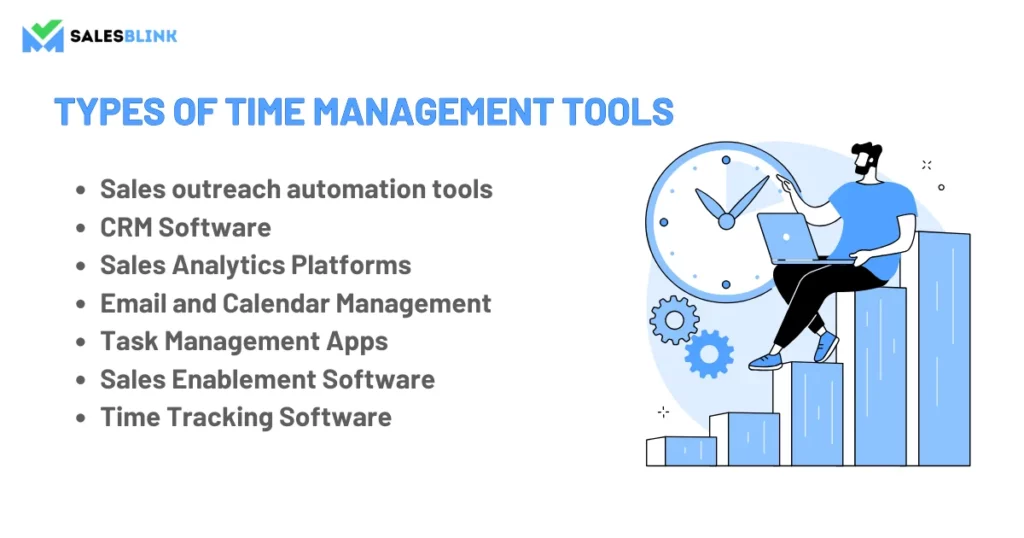Top 21 Tips To Improve Time Management For Sales Reps
In the fast-paced world of sales, where every minute counts, effective time management is the key to success. As a sales rep, you are always busy, trying to handle many things at once, like finding new customers, meeting clients, keeping in touch with them, and doing office work.
Without effective time management, it’s easy to become overwhelmed and miss out on potential sales opportunities.
But we’re here to help. In this blog will unveil the top 21 tips to help sales reps conquer the time management challenge. Whether you’re a sales professional or just starting in the field, these strategies will boost your productivity and sales figures.
By the end of this post, you’ll have a comprehensive toolkit to ensure you make the most of every moment, propelling your sales career to new heights. So, let’s dive in and master the art of time management for sales reps!
Table of Contents
- What is Sales Time Management?
- Types Of Time Management Tools For Salespeople
- The Best Sales Time Management Tips
- 1. Eliminate administrative tasks
- 2. Use the 80/20 rule
- 3. Follow a Process
- 4. Utilize Your Email Inbox
- 5. Eliminate or delegate unnecessary tasks
- 6. Avoid taking breaks after a win
- 7. Stick with the current task
- 8. Plan Your Day Around Your Customers
- 9. Create email templates
- 10. Reduce Distractions
- 11. Create Your To-Do List in Advance
- 12. Be Smart with Time Tracking
- 13. Chunk Your Time
- 14. Start Saying No
- 15. Create Time Constraints
- 16. Keep Sales Calls Short
- 17. Bucket and Group Your Tasks
- 18. Stop Multitasking
- 19. Streamline Repeatable Tasks
- 20. Outsource Scheduling
- 21. Use the Right Tools
- FAQs
What is Sales Time Management?
Sales time management refers to efficiently allocating and utilizing one’s time as a sales representative to maximize productivity and achieve better results. It involves prioritizing tasks and activities to ensure that sales reps spend time effectively on revenue-generating activities, such as prospecting, client meetings, and follow-ups, while minimizing time spent on administrative tasks and non-sales-related activities.
Effective time management for sales reps is crucial because it allows them to focus on activities directly contributing to closing deals and meeting sales targets. By implementing proven time management tips, sales professionals can streamline their workflow, set clear goals, and use tools to automate repetitive tasks, ultimately becoming more efficient and productive.
Therefore, sales time management is about working smarter, not harder, to achieve better outcomes in the competitive sales world. This blog post will give valuable insights and practical strategies to enhance your sales time management skills and boost your sales performance.
Types Of Time Management Tools For Salespeople

Time management tools for salespeople are like supercharged assistants that help sales reps, sales teams, and sales managers stay organized, efficient, and on top of their game. These tools are specially designed to align with the sales process and sales strategy, boosting overall sales productivity. Here are some types of time management tools that can make a significant difference:
1. Sales outreach automation tools
Sales outreach automation tools are essential for streamlining and optimizing the sales process. They empower sales teams to automate repetitive tasks such as building cold email campaigns and sending follow-up emails. Tools like SalesBlink enable personalized cold emailing, AI-assisted email writing & campaign building. Such sales tools increase response rates, and enhance overall sales effectiveness.
2. Customer Relationship Management (CRM) Software
CRMs are the backbone of sales management. They help sales reps track leads, manage contacts, and monitor interactions. By centralizing information, they save time and ensure everything runs smoothly in the sales pipeline.
3. Sales Analytics Platforms
These tools offer valuable insights into sales performance. They help salespeople focus on high-potential leads and opportunities, making the sales process more efficient.
4. Email and Calendar Management
Tools like Microsoft Outlook or Google Calendar are vital for scheduling meetings, setting reminders, and managing emails. They ensure that sales reps attend all important appointments and follow-ups.
5. Task Management Apps
Apps like Asana, Trello, or Todoist help sales teams prioritize tasks, set deadlines, and collaborate on projects. It ensures everyone is on the same page and tasks are completed on time.
6. Sales Enablement Software
These tools provide access to sales collateral, training materials, and product information. They save sales reps time by giving them quick access to resources they need to close deals.
7. Time Tracking Software
Time trackers help salespeople analyze how they spend their time. This information can be used to identify areas where time is being wasted and make adjustments for better time management.
By utilizing these time management tools, salespeople can set goals and focus more on selling and less on administrative tasks. They can optimize their workflows, collaborate effectively with their teams, and ultimately, drive better results in the competitive sales world.
The Best Sales Time Management Tips
Here are a few effective time management strategies that can help reps boost their productivity. Let’s dive into how to improve time management for sales reps.
1. Eliminate administrative tasks

One of the best sales time management tips is to eliminate administrative tasks. These tasks include paperwork, data entry, and organizing files, which can consume a significant portion of your day. As a sales rep, you should find ways to automate or delegate these activities, which can provide you with valuable time to focus on high-impact sales tasks.
Consider using tools and software to streamline administrative processes. For example, Customer Relationship Management systems can automate data entry and keep your client information organized. Effective sales time management skills involve recognizing which tasks truly contribute to your sales success and finding ways to minimize the time spent on less important activities.
2. Use the 80/20 rule

Consider the 80/20 rule or the Pareto Principle, a magic formula for sales. To make the 80/20 rule work in your favor when managing your time: Recognize that roughly 80% of your sales will come from just 20% of your prospects or existing customers. Not every opportunity you come across will turn into a sale, so it’s super important to pinpoint those high-potential prospects who have a real shot at becoming long-term, valuable customers.
It’s like having a goldmine in your backyard if you’re dealing with current customers. You can focus on offering them more products or services, significantly boosting your revenue. The key is to become a pro at figuring out who deserves your precious time and attention.
3. Follow a Process

Establish a clear and efficient sales process to excel in time management. This process acts as a roadmap, guiding you through each step, from identifying leads to closing deals. By following a structured approach, you can eliminate guesswork, minimize wasted time, and ensure that no crucial tasks slip through the cracks.
Your process should include stages like prospecting, lead qualification, nurturing, presentation, and closing. Customize it to fit your specific sales strategy and industry.
4. Utilize Your Email Inbox

Email is a primary communication tool for sales reps but can also be a time sink if not managed effectively. Implement email management strategies like setting specific times to check and respond to emails, using filters and labels to organize your inbox, and unsubscribing from unnecessary newsletters. Prioritize emails from prospects and clients, ensuring prompt responses to their inquiries.
5. Eliminate or delegate unnecessary tasks

One of the known time management tips for sales reps is eliminating tasks that don’t directly help you make sales. Things like paperwork, data entry, and organizing files might feel important, but they can consume much of your precious time. The trick is finding ways to either make these tasks disappear or have someone else handle them. For example, you can use special tools and software to do the boring stuff automatically. That way, you’re free to focus on what matters – selling!
6. Avoid taking breaks after a win

When you’ve just scored a big win or closed a sale, it’s tempting to take a victory lap and relax. But here’s the thing: it’s not the best time to take a break. Right after a win, you’re riding high on success, and that’s when you should keep the momentum going. Use that energy to tackle the next task or reach more potential customers. You’ll get more done and keep the sales train rolling.
7. Stick with the current task

Sometimes, you jump from task to task like a kangaroo on a trampoline. But that’s not the best way to manage your time. Instead, try sticking with one task until it’s done. It’s like building a house – you don’t start building five houses at once, right? The same goes for your sales tasks. Focus on one, finish it, and then move on. You’ll find that you get things done faster and better.
8. Plan Your Day Around Your Customers

Your day should revolve around your prospects. That’s where the sales happen! So, plan your day with your buyer in mind. When are they most likely to be available? When are they in a good mood? That’s when you should schedule your important sales activities, like calls and meetings. You increase your chances of successful sales by aligning your schedule with your buyer’s preferences.
9. Create email templates

Writing a completely new email whenever you want to talk to a potential customer isn’t smart. You should make each email special for that person, but here’s a trick to save time: use a template as your starting point.
Templates are like ready-made messages that you can tweak to fit the person you’re writing to. It’s like having a basic recipe for a cake, and you add different flavors to make it unique each time.
Here’s another tip: go check your “Sent” folder, where you keep all the emails you’ve sent before. You’ll likely notice that you send some types of emails repeatedly. It’s not just the first contact emails; it’s also things like follow-ups, meeting settings, and summarizing phone calls. You can create templates for these emails, so you don’t have to start from scratch every time.
10. Reduce Distractions

Imagine you’re in the middle of an important sales call, and your phone pings with a notification. It’s easy to get sidetracked. To stay focused, try these tricks:
- Turn off non-essential notifications: Those constant dings from social media or email can be incredibly distracting. Switch them off when you’re in sales mode.
- Designate specific times for email and social media: Instead of checking your email every few minutes, allocate specific days for this. It’ll help you stay on task.
- Find a quiet workspace: Choose a workspace that minimizes interruptions. If you work in a busy office, consider noise-canceling headphones.
11. Create Your To-Do List in Advance

A to-do list is like a roadmap for your day. Creating it in advance can save you precious time deciding what to tackle in the morning. Before you finish work, jot down the tasks you must complete tomorrow. It’ll give you a clear starting point in the morning. Not all tasks are created equal. Identify the most critical ones and tackle them first. It ensures you’re working on what matters most.
12. Be Smart with Time Tracking

Time tracking can help you identify where you’re spending your hours. Here’s how to do it smartly:
- Use time tracking tools: Many apps and tools can help you monitor how you’re spending your time. They can reveal patterns and areas where you can improve.
- Set time limits: For certain tasks, like checking emails or making follow-up calls, set specific time limits. It keeps you from getting lost in those activities.
13. Chunk Your Time

Instead of jumping between tasks, group similar ones together. For example, dedicate a chunk of time to making sales calls, then another to responding to emails. Further, short breaks boost your productivity. Use the Pomodoro Technique, which includes working for about 25 minutes and taking a 5-minute break. Some folks prefer longer chunks, like 90 minutes, which also works.
When you chunk your time like this, doing your best work is easier. It’s like finding your flow and making the most of each day.
14. Start Saying No

One of salespeople’s most important sales time management tips is to learn the art of saying “no.” It might sound counterintuitive, but saying no can be a powerful way to protect your time and focus on what truly matters. As a sales professional, you’re often bombarded with requests from colleagues and clients. While it’s tempting to try and accommodate everyone, overcommitting can lead to burnout and reduced productivity.
Here’s the trick: Assess the requests that come your way and prioritize those that align with your sales goals. If a task or request doesn’t contribute significantly to your sales efforts, politely decline or delegate it to someone else on your team. By guarding your time and saying no when necessary, you can ensure that you invest your energy in activities that move the sales needle.
15. Create Time Constraints

Setting time constraints is another effective sales time management strategy. Instead of giving yourself unlimited time to complete a task, allocate a specific amount. This can create a sense of urgency and prevent tasks from expanding to fill all available time.
For example, if you have to prepare a sales presentation, set a timer for a fixed duration, say 60 minutes. Challenge yourself to complete the presentation within that time frame. You’ll be surprised at how efficiently you can work when you have a deadline. Time constraints help you stay focused, avoid procrastination, and accomplish more in less time.
16. Keep Sales Calls Short

Sales calls are a critical part of your job but can also be time-consuming if not managed properly. Aim to keep sales calls concise and to the point to maximize your time. This respects your prospect’s time and ensures you can reach out to more prospects daily.
Here are some tips for keeping sales calls short and effective:
- Prepare: Have a clear agenda for the call and know what you want to achieve.
- Stay on Topic: Avoid drifting into unrelated discussions. Keep the conversation focused on the sale.
- Listen Actively: Pay attention to your prospect’s needs and objections and address them promptly.
- Set a Time Limit: Tell the prospect how long the call will take, and stick to it as closely as possible.
By making your sales calls more efficient, you can free up time for other essential tasks in your sales process.
17. Bucket and Group Your Tasks

Another effective sales time management strategy is to group similar tasks. This technique, known as task batching, can help you minimize the mental load of switching between different activities throughout the day.
Here’s how it works:
- Identify similar tasks: Group activities like prospecting calls, email follow-ups, data entry, and administrative work.
- Allocate specific time blocks: Dedicate specific chunks of time to each task group. For example, reserve the mornings for prospecting calls and the afternoons for meetings and administrative work.
- Minimize distractions: During each time block, focus solely on the tasks within that category. Silence notifications and avoid multitasking.
Task batching not only improves focus but also allows you to make better use of your energy and mental resources. It reduces the cognitive load associated with constantly switching between different types of tasks.
18. Stop Multitasking

While multitasking may seem like a time-saver, it’s often counterproductive. Research shows that attempting multiple tasks simultaneously can reduce overall productivity and the quality of your work.
Instead, embrace the power of single-tasking. When you focus on one task at a time, you can give it your full attention and perform it more efficiently and effectively. This leads to better results in less time.
To implement single-tasking:
- Prioritize tasks: Identify the most important task for the moment and tackle it without distractions.
- Use time management techniques: Set a timer for a specific task and work on it until it goes off.
19. Streamline Repeatable Tasks

Salespeople do the same things repeatedly, like sending out standard emails, logging data, or filling out reports. This eats up valuable time! The trick here is to find ways to make these tasks easier. You can create email templates for those common messages, use software to automate data entry and generate reports more efficiently. Streamlining these repeatable tasks frees up time for more important things, like talking to potential customers.
20. Outsource Scheduling

Scheduling can be a headache. Finding the right time for meetings, setting reminders, and managing your calendar can be time-consuming. Here’s where you can outsource. Use tools like scheduling apps that allow clients or colleagues to book appointments directly based on your availability. It’s like having your assistant managing your schedule.
21. Use the Right Tools

Many amazing tools are designed to make a salesperson’s life easier. Customer Relationship Management (CRM) software can keep all your client info in one place and remind you when it’s time to follow up. Sales analytics platforms help you focus on high-potential leads. Email and calendar management tools ensure you attend all important meetings and follow-ups. Task management apps keep you organized, and time-tracking software helps you see where your time goes.
Therefore, the bottom line is this: You need to be smart with yourr time. The more efficiently you manage your time, the more productive you’ll be. And in sales, productivity can lead to more sales, happier customers, and a brighter future for your career.
Master Sales Time Management for Success!
In the world of sales, time is a precious resource, and how we use it can be the difference between success and frustration. We’ve explored essential time management tips that can transform how salespeople work.
Sales professionals can supercharge their productivity by eliminating time-consuming administrative tasks, focusing on high-impact activities, and using the 80/20 rule. Outsourcing scheduling and using the right tools can also lighten the workload, allowing more time for building relationships and closing deals.
Sales management for reps isn’t just about squeezing more into your day; it’s about working smarter, not harder. It’s about prioritizing tasks, automating where possible, and staying organized. With these strategies, you’re well on your way to becoming a sales superstar, consistently hitting your targets, and enjoying a more balanced work-life.
So, go out there, implement these tips, and see your sales career soar to new heights.
FAQs
Time management in sales involves strategically organizing daily tasks, prioritizing sales activities, and scheduling to enhance efficiency and close deals within deadlines, optimizing overall sales performance.
In sales management, time management is vital as it ensures optimal use of time for high-priority deals, enhances customer relations, and leads to achieving sales goals within competitive timeframes.
Effective time management in sales involves prioritizing leads based on potential value, scheduling tasks, utilizing CRM systems for efficiency, and focusing on key sales activities to maximize productivity.







